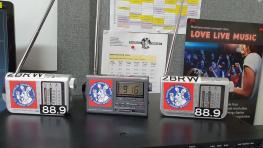
Community broadcasting recognised by Government for its efforts throughout Black Summer
The CBAA is pleased to see the Federal Government's recognition of the community broadcasting sector's hard word and dedication throughout and in the aftermath of Black Summer.
Throughout the bushfires that impacted much of Australia during the summer of 2019-2020, over 80 community broadcasting services either broadcast emergency information or played a vital role connecting and comforting local communities.
The CBAA, alongside Braidwood FM, provided evidence to the Senate Finance and Public Administration Committee's inquiry "Lessons to be learned in relation to the Australian bushfire season 2019-20".
This month, the Committee tabled a substantive interim report. In its report, the Committee noted:
The committee understands that prompt and accurate emergency and warning information saves lives, and acknowledges the important role that the ABC, commercial radio, and community radio play during bushfire emergencies. The committee applauds the vital work that all three sectors do in informing communities at risk each year. (8.88)
Braidwood FM's Station Manager, Gordon Waters, was quoted on his experience broadcasting in the NSW town of Braidwood through serious bushfires during the 2019-20 season. Gordon informed the committee of the large amount of effort that the community radio station had to put in in order to get relevant information from the local fire control centres. He stated:
We had challenges in our area because we border two local government fire zones. We had to talk to two different local fire control centres for information about fires that were impacting our region… At times, we found it difficult to actually contact the emergency management authorities to get accurate information or any information at all. For us, it was certainly a very big challenge to obtain accurate information. (8.33)
The CBAA also recommended the Committee explore the Victorian emergency broadcasting model - where community broadcasters can enter into formal arrangements with Emergency Management Victoria (EMV). This ensures that community broadcasters who wish to undertake emergency broadcasting are best briefed, connected to the emergency information source, and understand their responsibilities. The Committee, under Recommendation 12, recommended:
In regard to emergency broadcasting by community radio stations, the committee also sees merit in the Victorian emergency broadcasting model outlined by CBAA. It considers that an exploration of how this model could be expanded to other states is warranted. (8.97)
The Committee also made recommendations to support the streamlining of communications channels between radio stations and emergency services, and between community radio services and each state's emergency management service, among others.
The CBAA also recommended that there is need for ongoing and optimised funding for the sector, via the Federal Government's Community Broadcasting Program, to ensure stations in regional and rural areas are best resourced, trained and equipped to continuing providing emergency information and supporting community resilience. The CBAA is continuing to work with the office of Minister Fletcher and the Department of Infrastructure, Transport, Regional Development and Communications to ensure the funding for the sector is optimised and extends beyond what is currently highlighted in the Forward Estimates.
The CBAA was also pleased to see the interim observations of the Royal Commission into National Natural Disaster Arrangements (Royal Commission), which recognised the role of community radio alongside the ABC: "The Australian Broadcasting Corporation, alongside community radio, is acknowledged as a trusted broadcaster of emergency messages and warnings."
For further information, please contact CBAA's Project Coordinator (Government Relations) Holly Friedlander Liddicoat on [email protected]
Facebook comments